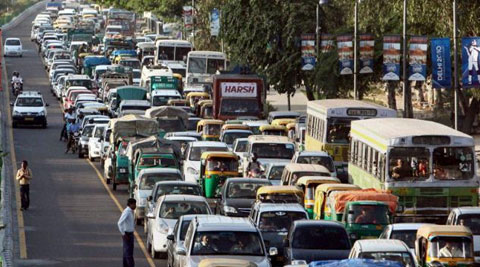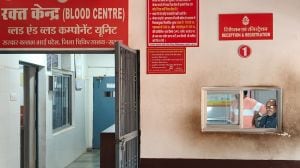Stay updated with the latest - Click here to follow us on Instagram
Variable office timings, speed limits in road safety policy
A road safety audit will be conducted and, on its basis, latest designs and techniques for construction of roads will be introduced.
 per capita vehicle population in the city is highest in the country. in 2011, city had 10.07 lakh vehicles and 10.54 lakh residents. (Source: PTI photo)
per capita vehicle population in the city is highest in the country. in 2011, city had 10.07 lakh vehicles and 10.54 lakh residents. (Source: PTI photo)
Exploring the option of staggered office timings, having variable speed limits during peak hours as well as in poor weather conditions, and identifying accident-prone areas are the highlights of a road safety policy which was notified by the Chandigarh Administration on Wednesday.
The policy aims at reducing accidents as well as congestion on the city roads. The per capita vehicle population in the city is the highest in the country. According to the Ministry of Statistics and Project Implementation, in 2011 the city had 10.07 lakh vehicles while its population was 10.54 lakh.
The high vehicle population causes traffic congestion on the roads, increasing the probability of accidents. In the last five years, on an average, there were 150 deaths due to road accidents every year. It comes to 10.5 deaths per 1 lakh population, against the national average of 32.3 per 1 lakh population.
Keeping these factors in mind, the administration has prepared the road safety policy. It lays focus on encouraging alternatives to motor vehicle use, ensuring safety of vulnerable users and improving medical response for road accidents.
In order to improve the road infrastructure, it is proposed to identify the ‘black spots’ or the accident-prone spots on the basis of intensity and severity of accidents. Steps will be taken for mitigating chances of accidents on these spots, and traffic bottlenecks like encroachments and obstructions will be removed. The concept of variable speed limits will be introduced and synchronization of traffic signals done to facilitate smooth flow of traffic.
Since most offices open at 9 am and close at 5 pm, traffic congestion is more during these hours. It is proposed that the option of staggered office timings will be explored.
A road safety audit will be conducted and, on its basis, latest designs and techniques for construction of roads will be introduced.
The administration will make efforts to implement a mass public transportation system so that the residents use less of private vehicles. Steps will be taken for encouraging computerisation and have linked databases related to vehicles, drivers, road conditions, load impact, crash details, etc.
It will be ensured that all government employees receive first-aid training on entry in service. The capacity of government hospitals to deal with emergency medical response for road accidents will be increased and private practitioners involved. Imposition of higher penalties for traffic offenses will be considered and correctional workshops held for offenders. For the implementation of the policy, the concerned departments will be required to formulate specific measures and take appropriate action. However, no timeline has been set.







